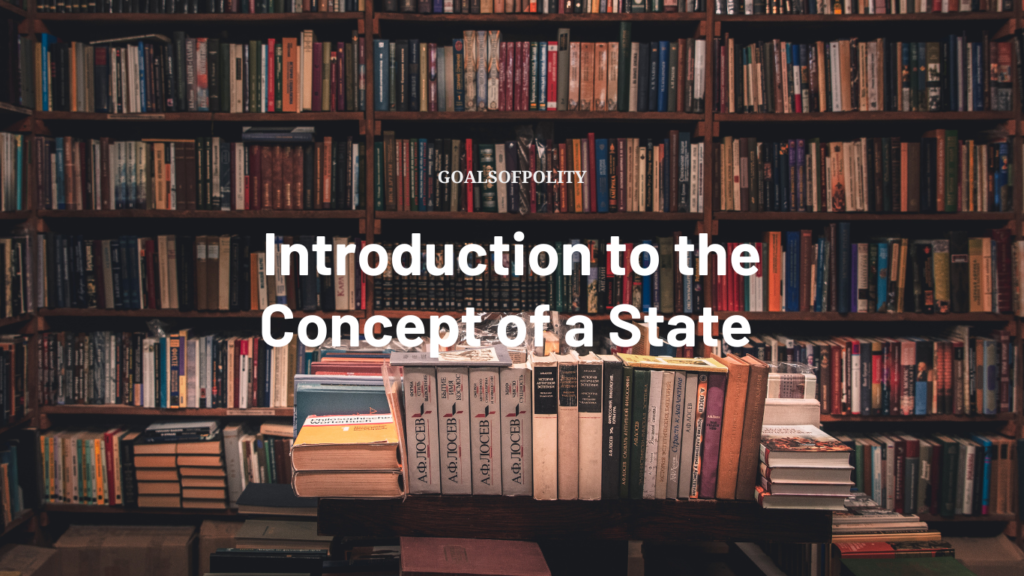
Table of Contents
The concept of a state is fundamental to political science and governance. It encompasses various elements that define a political entity’s structure, authority and functions.
Definition of a State:
A state is a politically organized community living under a single government. It is characterized by defined territory, population, government and sovereignty.
Historical Evolution:
Ancient Civilizations and City-States:
In ancient times, states emerged as organized political entities, often in the form of city-states like Athens and Sparta in Greece or Rome in Italy.
Medieval Feudal Systems:
During the medieval period, feudal systems prevailed, where local lords held authority over specific territories, marking a decentralized form of governance.
Modern Nation-States:
The modern concept of the nation-state emerged with the rise of nationalism and the establishment of centralized governments, consolidating territories under unified rule.
Elements of a State:
1.Territory:
Territory refers to the geographical area under the jurisdiction of a state. It provides the physical space for the state to exercise its authority and fulfill its functions.
2. Population:
A state’s population comprises its inhabitants, who may share common cultural, ethnic, or national identities. Population size and composition significantly impact a state’s demographics and societal dynamics.
3. Government:
The government represents the institutional framework through which a state’s affairs are managed and regulated. It includes the executive, legislative, and judicial branches responsible for governance and policymaking.
4. Sovereignty:
Sovereignty denotes a state’s supreme authority and independence from external interference. It allows states to make decisions and enforce laws within their territories without external coercion.
1. Territory:
Definition and Importance:
Territory encompasses both land and maritime areas under a state’s control. It serves as the physical foundation for statehood, providing space for governance, economic activities, and societal development.
Territorial Integrity:
Territorial integrity refers to the inviolability of a state’s borders and the prohibition of external aggression or annexation. It is essential for maintaining stability and security within the international system.
2. Population:
Composition and Diversity:
A state’s population may comprise diverse ethnic, religious, linguistic and cultural groups, contributing to its social fabric and identity. Managing demographic diversity is crucial for fostering cohesion and inclusivity.
Citizenship:
Citizenship confers rights, privileges, and responsibilities upon individuals within a state’s jurisdiction. It reflects the legal and political status of individuals as members of the political community, entitling them to participate in governance and enjoy protection under the law.
3. Government:
Types of Government:
Governments may take various forms, including democracy, monarchy, dictatorship, or hybrid systems. Each type has distinct structures, processes and power distribution mechanisms shaping state-society relations.
Functions and Responsibilities:
Governments perform essential functions such as maintaining law and order, providing public services, managing resources and representing national interests domestically and internationally.
4. Sovereignty:
Meaning and Significance:
Sovereignty embodies a state’s autonomy and authority to govern itself without external interference. It is a foundational principle of international relations, underpinning state equality and non-intervention.
Internal and External Sovereignty :
Internal sovereignty refers to a state’s ability to exercise authority within its borders, while external sovereignty pertains to its recognition and autonomy in the international arena. Both dimensions are essential for statehood and diplomatic relations.
The Job of the State in Political Theory:
States play a central role in political theory as primary actors in governance, policymaking and international relations. They shape political systems, influence global affairs and impact the lives of citizens through their policies and actions.
Contemporary Challenges to the Concept of the State:
The concept of the state faces various challenges in the contemporary world, including globalization, transnational threats, regional integration, and demands for greater autonomy or secession. Addressing these challenges requires adaptive governance mechanisms and cooperative approaches to global problems.
Conclusion:
It remains a cornerstone of political science and governance, embodying the principles of territoriality, population, government and sovereignty. Understanding its elements and historical evolution is essential for analyzing state-society relations and addressing contemporary challenges in a rapidly changing world.
FAQs:
What is the significance of territorial integrity for states?
Territorial integrity ensures stability, security, and sovereignty by safeguarding borders against external threats or encroachments.
How do governments differ in their structures and functions?
Governments vary in types such as democracy, monarchy, or dictatorship, each with distinct power dynamics and governance mechanisms.
Why is citizenship important in defining membership within a state?
Citizenship confers rights, obligations, and political participation opportunities, shaping individuals’ legal and social status within a state.
What are some contemporary challenges to state sovereignty?
Globalization, regional integration, and transnational threats pose challenges to state sovereignty, necessitating adaptive governance and multilateral cooperation.
How does the concept of the state evolve in response to changing global dynamics?
The concept of the state adapts to evolving global challenges, balancing traditional principles of sovereignty with cooperative approaches to address transnational issues.